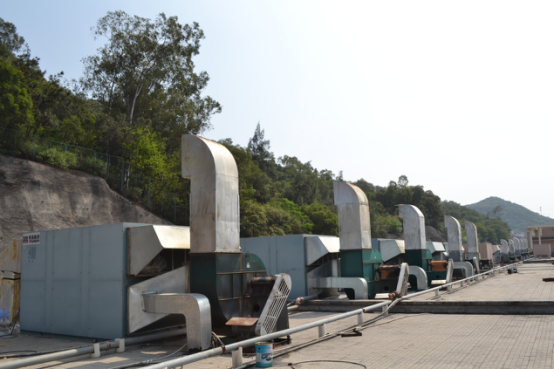Research and design of single-phase switched reluctance generator simulation research Nanjing University of Aeronautics and Astronautics (210016) Jiang Dongxuan Zhu Xuezhong also has many characteristics, but there is little research in this area, especially single-phase switched reluctance generator. Due to the special structure and the nonlinear factors of machine, electricity and magnetism, it is difficult to analyze with the mathematical model of traditional motor. Therefore, the single-phase 8/8 structure of kitchen hair is used as a prototype, and the numerical calculation method is used for simulation research. And the stator-phase winding is energized, the phase current is 丨, and the phase magnetic flux is small, thereby forming magnetic energy. According to the basic theory of the motor, if there is displacement in the magnetic system, energy conversion occurs, and the electromagnetic torque is. Jiang Dongqing was born in August 1975. He graduated from Harbin University of Science and Technology in July 1996 with a bachelor's degree in automation and an assistant engineer. Now he is engaged in the research and development of switched reluctance motors and the CAD work of motor CAD. When the inductance is expressed, the torque opposite to the steering is instantaneously generated. Using linearization to indicate that the section is energized, a negative torque is generated and the system absorbs mechanical energy into electrical energy output. The motor works in the power generation state. Correspondingly, if the control is energized in the interval, it is in the electric working state. If the number of stator teeth is equal to the number of rotor teeth, such as the 8/8 structure, all the windings are in phase, which constitutes a single-phase switched reluctance generator. 1.2 Single-phase switched reluctance generator characteristics Switched reluctance generator (SRG) consists of a doubly salient reluctance motor, a power converter, and a controller. The reluctance motor has a simple and robust structure, a simple manufacturing process, and low cost. The rotor is laminated by silicon steel sheet and can work at very high speed. The stator coil is concentrated winding, easy to insert, short and firm at the end, reliable in operation, and can be applied to various harsh, high temperature and even strong vibration environments. The loss of the motor is mainly generated in the stator, and the motor is easy to cool; the rotor has no permanent magnets to allow a large temperature rise. In addition, the power converter does not have a straight-through fault, and the motor output is a pulsating current suitable for charging the battery. For single-phase switched reluctance generators, the controller is further simplified, requiring only one set of switching tubes and a set of diodes, as shown by the motor lead-out line. Table 1 is given. In the simulation process, if the current waveform in each phase winding is obtained, the power, torque, copper loss and other characteristic parameters of the motor can be calculated. Therefore, the focus of circuit analysis should be on calculating the phase current of the motor. Under normal circumstances, the switched reluctance motor works in two states: excitation and power generation. The nonlinear mathematical model corresponding to the power main circuit is described as follows: Excitation state: The switch tube in the corresponding circuit is turned on, and the power supply supplies power to the phase winding to establish a magnetic field. Power generation state: The current in the switch-off winding of the corresponding circuit flows from the freewheeling diode to the power supply. - Current and phase resistance in the phase windings One phase flux linkage and rotor position angle (1) The angular velocity of the motor aut, the voltage drop of the switching tube and the freewheeling tube in the aud power circuit U* The power supply voltage is based on the voltage t/, the speed n and the different switches The working state of the tube (opening angle A, turning off angle for a long time), where CA1 is current, each large grid represents 2.0A; C/i2 is the main switch driving voltage waveform. It can be seen from the comparison that the simulation calculation is in good agreement with the measured waveform of the phase current of the test motor. 5 Conclusion This article discusses the theoretical basis of simulation analysis with SRG8/8, develops the corresponding simulation software, and introduces the measured results of the simulation computer prototype. The simulation has been verified by some practices. This simulation software, which can be used as a computer-aided design and analysis tool for SRG, has been effectively applied in the SRG6/6 prototype. Of course, due to the nonlinearity and complexity of the system, the simulation software needs to be further improved to improve the calculation accuracy.
Air To Air Waste Heat Recovery Equipment
No heat transfer medium
Air to Air Waste Heat Recovery Equipment Air To Air Waste Heat Recovery Equipment,Waste Heat Recovery Machine,High Efficiency Waste Heat Recovery Equipment,Waste Hot Air Recovery Machine Dalian Transen Technology Co.,Ltd. , http://www.transen-china.com
through and exchange energy(heat-recovering system and exhaust heat recovery system). It can separate fresh air and exhaust air completely, avoided
any solvent transmission. The two air cross and counter flow to the exchanger, then fresh
air and exhaust air exchange energy through the metal plate,
collisions between particles in the hot inner region transfer energy to particle
s in the cooler outer region and realize to recycle energy from exhaust air.
Specifications
Modular construction
Compact structure
Dust prevention
